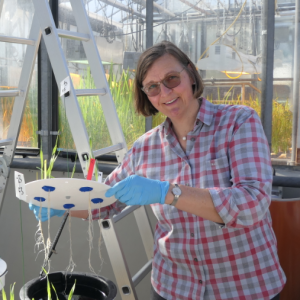
In 1990 I graduated in biology at the University of Kiel, Germany. Already as a student I started to work on a directly marketing farm with livestock and special crops, e. g. strawberries and asparagus. I stayed there after having achieved my diploma and worked for over 25 years in the farm´s management. In 2017 I started master studies in crop science at the University of Bonn and am currently a PhD student at the Dep. of Plant Nutrition at INRES, University of Bonn. There I am working in Core project 2 „Relevance Detection of Crop Features“ of the PhenoRob Cluster of Excellence.
Nitrogen deficiency of field crops is often diagnosed by optical sensors of ground-based fertilizing systems that use “greenness” i.e. chlorophyll content as a proxy for nitrogen sufficiency or deficiency. However, nitrogen deficiency is not the only reason causing low chlorophyll content since a number of biotic and abiotic stresses including imbalances in other nutrient elements can easily be interpreted as N-deficiency by current sensor technology with negative consequences for crop management, i.e. poor yield and severe environmental consequences due to excess N-application. In consequence, a better technology to detect nutrient imbalances accurately and with good temporal and spatial resolution is essential for sustainable crop production.
Deep machine learning offers the opportunity to develop sensor systems of much higher accuracy. Here we describe an experimental system that provides the opportunity to raise exhaustive data sets of nutrient deficient crop plants as a base for machine learning approaches and in parallel, plant material to validate the accuracy of a sensor detection by investigating the plant´s gene regulation in response to nutrient deficiencies. Reference transcriptomes for single nutrient deficiencies are obtained from plants grown in strictly controlled, single nutrient deficient hydroponic cultures and are the base for later in-field validation of sensor detection by transcriptomic means. The experimental system that we describe presents ranges from the investigation of nutrient deficiencies in plants in nutrient solutions, through experiments with plants in potted nutrient-poor soil, to long-term fertilizer field experiments.
Marion Deichmann1, Jinhui Yi2, Yeshambel E. Mihiret1, Jürgen Gall2 and Gabriel Schaaf1
1Institute of Crop Science and Resource Conservation, Department of Plant Nutrition, Rheinische Friedrich-Wilhelms-Universität Bonn, Germany;
2Department of Information Systems and Artificial Intelligence, Computer Vision Group, Rheinische Friedrich-Wilhelms-Universität Bonn, Germany